This piece is part of a series titled “Nonstate armed actors and illicit economies in 2023” from Brookings’s Initiative on Nonstate Armed Actors.
In Syria’s civil war, now entering its 12th year, the state/nonstate divide has become increasingly blurred. Nowhere is this more evident than in the practices adopted by ruling elites in regime- and opposition-held areas to ensure access to resources. Over time, both state actors and nonstate armed groups have produced parallel, interconnected, and interdependent political economies in which the boundaries between formal and informal, licit and illicit, regulation and coercion have largely vanished. Border areas in Syria now constitute a single economic ecosystem, linked by dense ties among networks of traders, smugglers, regime officials, brokers, and armed groups. Competing zones of political control have had little effect on economic collaboration across conflict lines. When it comes to trade, pragmatism reigns.
Regime-held areas, Turkey, and to a smaller extent the Kurdish Regional Government (KRG) of Iraq now function as the economic hinterlands that sustain the economies controlled by armed actors across northern Syria. Trade across conflict lines and international borders brings unrefined oil from northeast Syria to regime refineries along the coast. Syrian-owned factories in southern Turkey, many relocated from northern Syria, supply a vast range of household goods to opposition-held areas. Medicines and other essential supplies travel from regime areas into opposition zones of control. Trade has also influenced patterns of conflict. Cross-line and cross-border checkpoints have become areas of particular volatility, where outbursts of violence may have less to do with efforts to secure military advantage than with economic disputes.
These trends deepen civilian populations’ vulnerability to predation, extortion, and abuse. Mitigating civilian harm and strengthening human security must be core criteria in assessing humanitarian provision and engagement with both the regime and rebel groups in Syria.
The consolidation of an interconnected economic ecosystem also has important implications for any post-conflict transition. Typically, nonstate actors face uncertainty about their longevity. However, as Syrian President Bashar al-Assad’s strategy of economic governance converges with that of nonstate armed groups, the likelihood increases that nonstate actors will survive a settlement that restores regime authority over contested areas of the country. A settlement that does not address systemic and structural criminality will do little to improve social, economic, and security conditions for the civilian population.
STATE-MAKING, STATE DECAY, AND PREDATORY ECONOMIES
In both state and nonstate areas, ruling coalitions have either captured or established formal institutions to legitimate their authority. They assume the mantle of stateness by providing rudimentary social services and regulating local markets and cross-line, cross-border exchange. They manage the distribution of essential commodities and humanitarian aid and impose elaborate systems of formal and informal taxation. These efforts are underpinned by and enable predatory, criminal, and coercive practices that provide for the economic survival of warring factions and the enrichment of their leaders. Both state and nonstate actors engage in forced detention, torture, and extrajudicial killing to suppress dissent, maintain their authority, and protect their economic privileges.
In regime-controlled areas of Syria, these conditions are the product of long-term processes of state devolution since Assad took power, amplified and accelerated as his regime adapted to the exigencies of conflict, extensive sanctions, and, more recently, Lebanon’s economic collapse. Devolution has unfolded along two main lines. One is the capture of state institutions and state functions and their transformation into instruments of regime predation. The other is the massive expansion of regime-led illicit economic activities that constitute an increasingly important source of regime revenue. These range from large-scale production of illegal drugs like captagon, to smuggling, racketeering, informal taxation of cross-line trade, extortion, and other forms of illegal profiteering. Senior military figures like Assad’s brother, Maher al-Assad, and the 4th Battalion of the Syrian Armed Forces he commands are centrally implicated in every level of this “parallel economy.”
In areas held by opposition armed groups, an inverse form of extractive-predatory political economy has emerged. If in regime-held areas organized crime exploits and permeates existing state structures, conditions in rebel-held areas can be seen as a form of “state-making as organized crime.” In keeping with sociologist Charles Tilly’s characterization of war-making and state-making as “quintessential protection rackets with the advantage of legitimacy,” nonstate actors across northern Syria have worked systematically to endow themselves with attributes of stateness. They have transformed themselves from insurgent armed groups into governing authorities that exhibit many of the institutional forms and legalistic features of full-fledged states, including investments in activities to generate local legitimacy.
CONFLICT AND COOPERATION IN A PREDATORY ECOSYSTEM
Despite broad commonalities in their economic practices, formal frameworks of economic governance reflect the area’s fractured geopolitical context and differences among armed groups in how they envision what the states they are constructing should look like and function. Such differences are evident in the formal institutions that oversee how local economies are regulated and taxed, how social provision is organized, and how revenues that accrue to formal governments are allocated — creating a thin veneer of legalism that does little to conceal the informal, predatory, illicit, if not criminal economic practices that drive economic activity across all three zones of control.
In areas controlled by Hay’at Tahrir al-Sham (HTS), a Sunni Islamist political and military organization, and those nominally under the control of the Syrian Interim Government (SIG), armed groups and their affiliated political wings have acquired the institutional frameworks of full-blown states, with elaborate governance structures that include presidents, cabinets, ministries, regulatory bodies, executive agencies, and so on. Operating as the Syrian Salvation Government, HTS has expanded its capacity to regulate, tax, and provide limited services to civilian populations. Yet as recent studies have shown, these institutions are mechanisms that empower and enrich senior figures within ruling coalitions.
In Turkish-occupied and controlled areas of northwest and north-central Syria, the SIG is the nominal governing authority. Its writ formally extends to HTS’s zone of control where it has been marginalized by HTS and the Salvation Government. Within Turkey’s zone of control, a Turkish-backed coalition of armed groups, the Syrian National Army (SNA) — not to be confused with Assad’s Syrian Armed Forces — is more powerful than the SIG, which it routinely ignores or overrides. Both, in turn, operate under the de facto authority of Turkey. Turkey’s presence brings a measure of stability, but its reliance on undisciplined local proxies, its inability to overcome factionalism among the dozens of armed groups affiliated with the SNA, and its tolerance of their abuse and exploitation of civilian populations has made its zone of control the least secure and most brutally governed in northern Syria.
In Raqqa, Deir Ezzor, and Hasaka provinces, the Kurdish Democratic Union Party (PYD) and its armed militia, the People’s Protection Unit (YPG), govern the Autonomous Administration of North and East Syria (AANES) through an affiliated armed group, the U.S.-backed Syrian Democratic Forces, an ethnically mixed militia led by Kurdish commanders. Civilian governance is managed by Syrian Democratic Councils in the PYD’s zone of control encompassing some 19,000 square miles. In theory, the Autonomous Administration sets overall policy and controls executive bodies that oversee key aspects of the economy, including the oil and gas sector that represents the AANES’ most important source of revenue, while local actors organized as communes set local economic policies. In practice, however, as reflected in one analysis of the political economy of the AANES, “signs of its authoritarian legacy are notably felt in its governance and economic management.” As in other zones of control, it is the dominant political actors in the YPG, their security affiliates, and influential business actors who exert ultimate control over the economy, enabling the illicit activities of private sector traders who maintain extensive smuggling networks across zones of control, regime-held areas, and into Iraq through ties with the KRG.
ARMED ACTORS AND THE CHALLENGES OF HUMAN SECURITY
Across Syria, a decade of conflict has led to state devolution in regime-held areas alongside the emergence of proto-states in opposition-held areas. Both processes have converged around shared strategies of economic governance as forms of organized crime. In both regime- and opposition-held areas, authoritarian ruling coalitions dominated by armed actors have captured or created formal institutions that nominally regulate an interconnected and interdependent economic ecosystem based on predation, extortion, smuggling, bribery, and violence.
As the categories of state/nonstate lose meaning on the ground in Syria, and economies become more deeply interconnected across conflict lines, the shape of a potential transition to post-conflict becomes both clearer and more disturbing. External actors look to a political settlement, however remote this might appear, as an opportunity to reform institutions, improve governance, and reduce criminality. It seems more likely, however, that it will legitimate and further entrench existing economic arrangements. Such an outcome becomes even more plausible under scenarios in which the normalization of the Assad regime advances without a settlement.
For practitioners and policymakers, the principal lesson to take away from Syria’s experience is the need to prioritize human security in both the delivery of humanitarian assistance and in negotiations around Syria’s transition to post-conflict. Without a commitment to mitigate the civilian harms caused by predatory economic orders, any political settlement in Syria will be fragile and a return to armed conflict more likely.
The Brookings Institution is committed to quality, independence, and impact.
We are supported by a diverse array of funders. In line with our values and policies, each Brookings publication represents the sole views of its author(s).

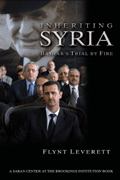
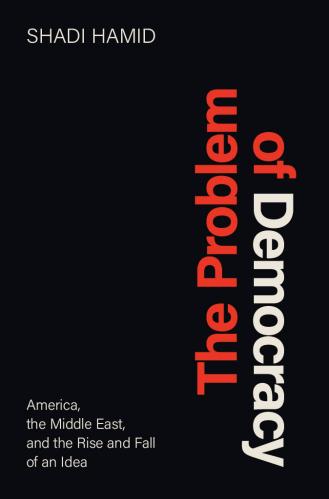
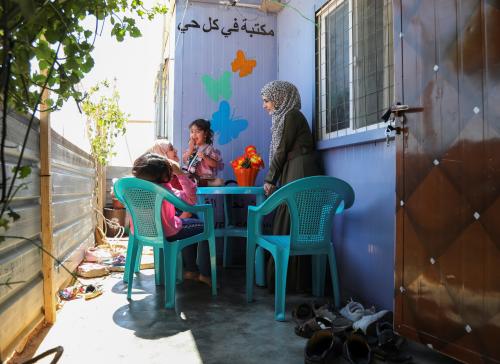
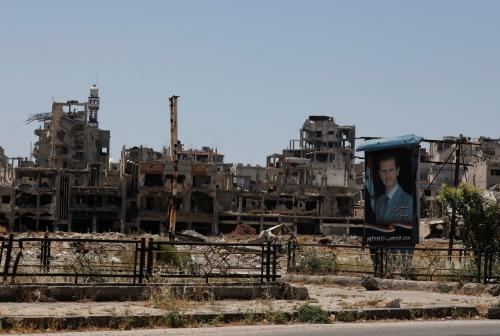

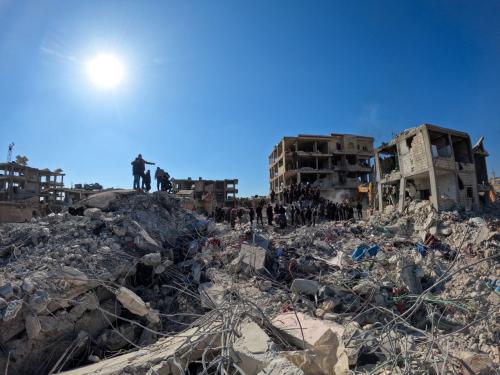
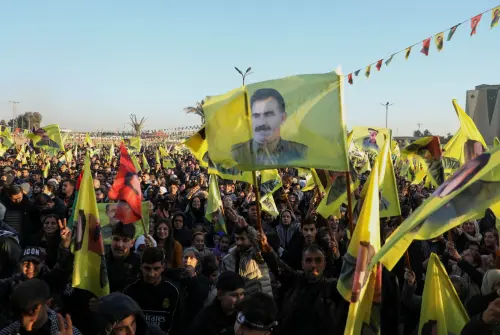
Commentary
Syria’s dissolving line between state and nonstate actors
January 27, 2023